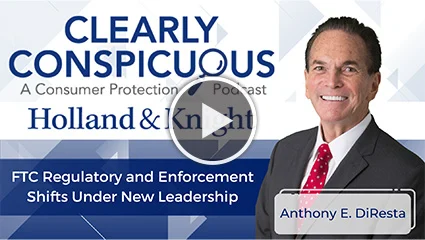Welcome to our eighth podcast of "Clearly Conspicuous." Our goal in these podcasts is to make you succeed in this current regulatory and governmental environment that's very aggressive and progressive, make you aware of what's going on with the federal and state consumer protection agencies and give you practical tips for success. It's a privilege to be with you today.
A Conversation with Michael Ostheimer
Today's topic is, the regulation of social media and advertising law according to the Federal Trade Commission (FTC), coming straight from the horse's mouth. Earlier this week, my law partner Da’Morus Cohen and I interviewed Michael Ostheimer, a senior attorney in the FTC's Division of Advertising Practices, who specializes in social media advertising and governmental law investigations. He covered numerous topics, and my colleagues and I [issued] an Holland & Knight Alert or publication on the interview. But, in the meantime, here are a few highlights. So let's look at 16 specific items.
- The FTC will be issuing its amendments to the Guides on Testimonials and Endorsements. Michael told us that the FTC has received 30 comments, and staff is reviewing them, making recommendations to the Commission and then considering staff recommendations. The issues including changing the definition of endorsements to include fake reviews, addressing virtual influencers and clarifying adding definition of clear and conspicuous.
- He also talked about review gating, where brands encourage positive reviews, with results in sending positive reviewers in one direction and negative reviewers in another way. The harm is accepting money from manufacturers in exchange for higher rankings.
- The FTC has sent Notices of Penalty Offenses to more than 700 companies concerning the triggering of civil penalties for their potential use of fake reviews and other misleading endorsements. The FTC may notify companies if certain acts or practices are deceptive or unfair, and then can bring enforcement actions against those companies who received notices.
- Michael plainly warned: Don't provide fake and false reviews. While companies are not responsible for all false reviews, liability can result if they do anything to incentivize fake or false reviews. Furthermore, companies should not bias or distort reviews.
- Companies may view any harm to the consumer as speculative. As in most cases with deceptive reviews, there often is no allegation that the product or service did not perform as represented. However, the FTC believes that even if no allegation that product or service is problematic, fake or inflated reviews, harm results warranting governmental action.
- The FTC has taken an aggressive and vigorous enforcement approach in the endorsement and testimonial space. There is a line between an actor speaking independently and a sponsored advertising message. It is the FTC’s position that a platform holder should actively monitor the particular users of that platform.
- As we discussed in an earlier podcast, the FTC has revised its Health Products Compliance Guidance. The FTC has seen an uptick in enforcement within the health products space especially in light of the COVID-19 pandemic.
- When it comes to the rules for channels like Twitter, Facebook, Instagram, YouTube, TikTok and livestream to disclose content, consumers should not have to click on "more" to see material terms. And, if there are endorsements throughout a livestream, there should be disclosures throughout.
- With respect to sweepstakes, viewers should know that a post means entering a sweepstakes; it should be clear to identify "XYZ sweepstakes" where XYZ is the brand name.
- In terms of new developments in social media technology or marketing practices, the FTC is concerned about artificial intelligence, as well as fraud in whatever form, deep fake and other synthetic media, which poses major risk around fraud and dark patterns.
- The FTC recently launched a new Office of Technology with the goal to "keep pace with technological challenges in the digital marketplace." It will directly assist in enforcement investigations or actions, and will assist in research and policy development.
- We talked about dark posting, or "dark patterns," and Michael said that to comply with FTC Act, companies should make sure interfaces do not create false beliefs, do not bury fees or terms in dense documents or places where unlikely to see before purchasing.
- Claims with "Made in USA" is of high interest with the FTC right now.
- The FTC brought an action against Bountiful Company and obtained a judgment of $600,000. It involved "review hijacking," where the company had higher product ratings and reviews and higher average ratings. In that action, the company repurposed reviews for one product to appear to be for a different, unrelated product.
- Michael identified the factors that lead the FTC to commence investigations. Here is the list he provided: consumer complaints, complaints from competitors, information from former employees, information from advocates, press articles, congressional inquiries, staff-generated sweeps and something that simply catches their attention.
- The FTC expects to increase its cooperation and involvement with the state attorney generals (AG). Given the loss in the Supreme Court in the AMG case to get disgorgement to get loss through 13(b), coordination with AGs assist in getting monetary remedies.
That’s a lot to digest. There was a lot more, so please look out for Holland & Knight’s Alert and Analysis.
Key Takeaways
Here are the key takeaways. Social media advertising and marketing is regulated by the FTC. Advertising and marketing practices is a key aspect of the FTC's work. Please stay tuned to further programs as we identify and address the key issues and developments, and provide strategies for success. I wish you continued success and a meaningful day.

